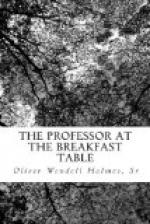But Mary, faithful to
its lightest word,
Kept in her heart the
sayings she had heard,
Till the dread morning
rent the Temple’s veil,
And shuddering Earth
confirmed the wondrous tale.
Youth fades; love droops;
the leaves of friendship fall;
A mother’s secret
hope outlives them all.
VI
You don’t look so dreadful poor in the face as you did a while back. Bloated some, I expect.
This was the cheerful and encouraging and elegant remark with which the Poor Relation greeted the divinity-student one morning.
Of course every good man considers it a great sacrifice on his part to continue living in this transitory, unsatisfactory, and particularly unpleasant world. This is so much a matter of course, that I was surprised to see the divinity-student change color. He took a look at a small and uncertain-minded glass which hung slanting forward over the chapped sideboard. The image it returned to him had the color of a very young pea somewhat overboiled. The scenery of a long tragic drama flashed through his mind as the lightning-express-train whishes by a station: the gradual dismantling process of disease; friends looking on, sympathetic, but secretly chuckling over their own stomachs of iron and lungs of caoutchouc; nurses attentive, but calculating their crop, and thinking how soon it will be ripe, so that they can go to your neighbor, who is good for a year or so longer; doctors assiduous, but giving themselves a mental shake, as they go out of your door, which throws off your particular grief as a duck sheds a raindrop from his oily feathers; undertakers solemn, but happy; then the great subsoil cultivator, who plants, but never looks for fruit in his garden; then the stone-cutter, who puts your name on the slab which has been waiting for you ever since the birds or beasts made their tracks on the new red sandstone; then the grass and the dandelions and the buttercups,——Earth saying to the mortal body, with her sweet symbolism, “You have scarred my bosom, but you are forgiven”; then a glimpse of the soul as a floating consciousness without very definite form or place, but dimly conceived of as an upright column of vapor or mist several times larger than life-size, so far as it could be said to have any size at all, wandering about and living a thin and half-awake life for want of good old-fashioned solid matter to come down upon with foot and fist,—in fact, having neither foot nor fist, nor conveniences for taking the sitting posture.
And yet the divinity-student was a good Christian, and those heathen images which remind one of the childlike fancies of the dying Adrian were only the efforts of his imagination to give shape to the formless and position to the placeless. Neither did his thoughts spread themselves out and link themselves as I have displayed them. They came confusedly into his mind like a heap of broken mosaics,—sometimes a part of the picture complete in itself, sometimes connected fragments, and sometimes only single severed stones.




